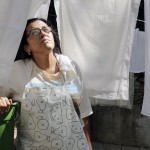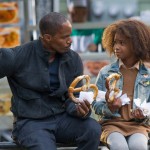The low-budget British independent film, The Fold makes the most of the wild coastline of Cornwall and the fields of daffodils harvested by Bulgarian workers who live in gypsy camps on the outskirts of Truro. If The Fold had been shot by Henri Georges Clouzot (Diaboliques) it might have been a top notch psychological thriller. But in the hands of first-time feature Director, John Jencks and feature scriptwriter Poppy Cogan, the contrivances are a bit too obvious and the drama slips into melodrama.
Attractive forty-something Anglican priest Rebecca Ashton (Catherine McCormack) moves with her 19-year-old daughter Eloise (Dakota Blue Richards) from Bristol to their impressive home, balanced precariously on a cliff in Cornwall. Rebecca needs to recover from a recent tragedy and she accepts a job at the local parish church.
Rebecca’s businessman husband (Owen Teale) is frequently away and cannot offer her the support she needs. From the film’s first shot of a young woman drown in the family’s swimming pool, to Rebecca’s frequent flashbacks of that haunting image, we assume that the couple’s eldest daughter committed suicide after a lawn party.
Rebecca is surprisingly cold toward Eloise and each lead their separate lives. Rebecca administers her little Church (St Winwalloe, for those who know the area) and volunteers at a homeless centre, while Eloise plays violin duets with Lukas (Jakub Gierszal), a handsome Polish daffodil picker.
Coincidentally, Rebecca befriends Radka (Marina Stoimenova) a talented but suicidal Bulgarian girl who lives in the same camp as Lukas. Ostensibly, Rebecca wants to help her pass her English exam so that she can separate from her abusive boyfriend and something of her life, although it’s pretty clear some guilt is also motivating this charity work. But Rebecca is distressed and needy and the seemingly vulnerable beauty, Radka, turns out to be manipulative and possessive. Soon their unorthodox relationship comes to the attention of the homeless centre manager Daniel (Oliver Dimsdale).
The cast tries hard to make all this high drama plausible and, to their credit, we aren’t bored. We are not entirely enthralled, either, primarily because Rebecca seems like the most unsympathetic mother and least likely priest you could imagine.
The sub-plot of Eloise and Lukas feels contrived while Radka’s relationship with a posh local boy is underdeveloped. The ending is all too neat, symbolised not only by a near drowning episode to tie in with the opening shots, but by Eloise’s deep knife wound disappearing in a matter of weeks without a scar. The increasingly creepy relationship between the two women is the strong point of the film, but Jencks needed to crank up the atmosphere and tension to make the most of it.
Joyce Glasser




